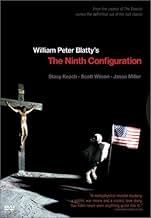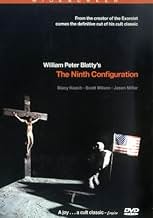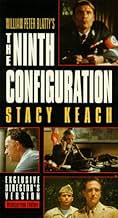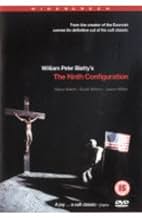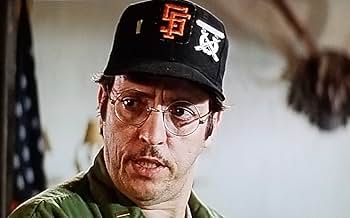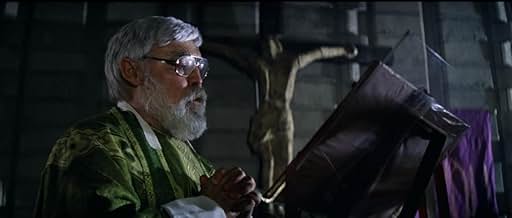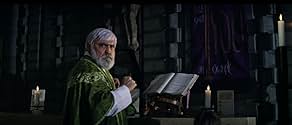Ajouter une intrigue dans votre langueAn ex-marine psychiatrist attempts to rehabilitate his patients by indulging their fantasies, and seeks to prove the existence of a loving God to one especially troubled inmate.An ex-marine psychiatrist attempts to rehabilitate his patients by indulging their fantasies, and seeks to prove the existence of a loving God to one especially troubled inmate.An ex-marine psychiatrist attempts to rehabilitate his patients by indulging their fantasies, and seeks to prove the existence of a loving God to one especially troubled inmate.
- Réalisation
- Scénario
- Casting principal
- Récompenses
- 3 victoires et 4 nominations au total
Avis à la une
William Peter Blatty wrote 'The Exorcist' as the first part of a trilogy of novels, the other installments being 'Twinkle twinkle killer Kane' and 'Legion'. 'Twinkle twinkle killer Kane' was adapted to the screen by Blatty as 'The Ninth Configuration' and where 'The Exorcist' explored the argument for the existence of God through the palpable presence of evil, 'The Ninth Configuration' continues the argument through exploring the presence of good in a universe purported by science to be empty, blindly deterministic, and amoral.
At the start of the film we are introduced to a motley band of members of the military who, in the course of the Vietnam War, have all suffered various kinds of mental breakdown and for their treatment have been sent to a reconstructed European castle in some remote American mountains (the film was actually shot in Hungary). Chief among these is the astronaut Capt. Billy Cutshaw (Scott Wilson) whose illness is seen as somehow key in that it is clearly not feigned due to cowardice as he was never scheduled for combat. This introduction sets the tone for the first part of the film and the portrayal of mental illness is somewhat zany and comedic and continues as we are introduced to the other main character, the psychiatrist Colonel Kane (Stacy Keach). Col. Kane, with the support of fellow psychiatrist Col. Fell (Ed Flanders), then institutes an unorthodox treatment which indulges the fantasies of the inmates in an attempt to invoke a catharsis which is when all (comedic) hell breaks loose and it is against this anarchic backdrop that Cutshaw argues with Kane for the absurdity of believing in God in a world in which undue suffering proliferates.
The light-hearted whacky tone gives way in the second half as Kane and Cutshaw's arguments become more penetrating (although not completely, as Cutshaw's choice of wardrobe to a Christian Mass will testify!) and the climax of the film is a double-whammy of a plot reveal that casts the performance of Ed Flanders as Col. Fell in a pathos infused light (which can only be fully appreciated with repeat viewings), as well as a bar room fight that will have you stuck to your screen as the tension builds and builds to an explosive finale.
Unfortunately, owing to the fact that a theological tragi-comedy is not the stuff the popcorn and soda crowd really go for, 'The Ninth Configuration' has fallen into the "cult" film category, which is a shame as another film with as fine a plot carried off by as fine a cast (not to mention a wealth of quotable one-liners) you are unlikely to see. However, while the film clearly deserves wider recognition (especially given it's conceptual relationship to 'The Exorcist'), those that seek it out, or fortuitously stumble upon it , are in for a real treat!
The spectacular direction, acting and cinematography cannot, in my mind, completely compensate for the implausibility of the plot reveal, which occurs about 2/3 of the way. That implausibility, at least as presented, distracts in turn from the treatment of the serious existential questions the film asks because after the reveal, events to make the movie's point seem contrived to be "just so".
Evidently, the expression "ninth configuration" is supposed to refer to the improbability of proteins randomly rearranging themselves to give rise to life. An astronomically small number is mentioned,and compared unfavorably to the probability for the existence of God, but I must admit that, as a scientist, I had never heard this term before. Nor does it seem to me that anyone could seriously calculate the probability of life arising on earth, given that the sample size of planets where this is known to have occurred is exactly one (there is something called the Drake equation for estimating the number of alien civilizations, which requires estimates for the probability of life in other worlds, but there are too many unknowns to make it possible to perform a serious calculation).
I have found that theological arguments are sometimes dressed up in mystical-sounding mumbo jumbo, and can't escape the suspicion that this might be the case here, too. However, that does not diminish the importance of the question itself of how life could have arisen.
The main philosophical question this films asks, however, is this: if we are really just a collection of atoms, perpetuating a phenomenon involving proteins which originated in an incredibly improbable random event long ago, then whence comes goodness?
The premise behind the question is strongly reductionist: for example, we have at least some biology-based frameworks for understanding altruism in higher organisms, and even if some proteins may play a role in these, the behavior of atoms at that level has long faded into explanatory irrelevance.
The movie is idiosyncratic and plays really well with our expectations. There is a hilarious scene in the beginning involving a short exchange between the protagonist and the man himself, which both foreshadows events to come, and sets us up to question what is real and what is not.
Scene after scene, we are sprayed with rhetorical snippets and actions by the mental patients (and even the attending physician) which seem nonsensical, but then, every once in while, there is follow-up dialogue which makes clear that what we thought was nonsense actually makes perfect sense.
No doubt Blatty did all this to disorient us, the audience. I can only speculate, but I suspect he sought to achieve a state of disorientation in the audience because it is, in a way, the best possible state to be in when asking the most fundamental questions: since we are not certain of anything, we cannot attach ourselves with certainty to any side of the debate.
And not taking sides is nowhere more important than when we try to really get to the bottom of things.
If my speculation is correct, then the set-up is nothing short of a stroke of genius. It makes how the aforementioned plot-reveal was handled all the more disappointing.
My problem is that an impossibly far-fetched set of events is presented to us straight. If, instead, it had taken the movie, say, in a surreal direction, then it would not have cheapened the film's attempts to provide an answer to the main question. As presented, it makes the final sacrifice, and especially the very last scene, seem like plot devices which betray that the author has, after all, taken sides.
Despite this criticism, CONFIGURATION is an impressive debut.
Films with similar elements:
1. ONE FLEW OVER THE CUCKOO'S NEST (1975)
2. AMARCORD (1975)
3. KING OF HEARTS (1966)
Colonel Kane (Stacey Keach, 'The Long Riders', 'American History X') is sent to a top secret facility full of military personal suffering from breakdowns, delusions and other mental problems. While attempting to find some way to cure them he becomes particularly concerned with a tortured astronaut, Captain Cutshaw (Scott Wilson, 'In Cold Blood', 'The Way Of The Gun'), and the two form a special, odd relationship. However things are not what they first appear to be, and to give anymore plot points away would be criminal. All I can say is that you're in for one hell of a ride!
Keach and Wilson are both outstanding in two of the best roles of their careers, but what really makes this a must-see is the superb supporting cast of character actors who are all equally good, and spout some of the freshest, most memorable dialogue you'll ever hear. Some of them include Robert Loggia ('Lost Highway'), Jason Miller ('The Exorcist'), Tom Atkins ('Maniac Cop'), Moses Gunn ('Rollerball'), Neville Brand ('Eaten Alive'), Joe Spinell ('Maniac') and Richard Lynch ('Open Season'). This movie is heaven for b-grade film buffs, and I can't recommend it highly enough. An unforgettable experience.
Blatty throws away much of the mainstream ideas of filmmaking in his quite impressive directorial debut as he brings his 1966 novel TWINKLE, TWINKLE KILLER KANE to the screen. I have not read the book, but what we get in the end it may have in fact been difficult to have the big studios understand what he was bringing to the screen. I think Martin Scorsese's SHUTTER ISLAND has a bit to thank this film for.
An insane asylum is being run by the US government for those who were in the military. The setting is excellent as a old abandoned castle is where it is set. A new psychiatrist is coming on board Col. Vincent Kane (wonderful performance by Stacy Keach). We are introduced to all of the inmates of the asylum and each give great performances (including Jason Miller, George DiCenzo and Moses Gunn to name just a few). Kane becomes quite involved with former astronaut Capt. Billy Cutshaw (Scott Miller) and in turn leads to thoughts on sacrifice, faith and God.
To me Keach puts in quite an amazing performance and the scene near the end where Capt. Cutshaw goes to the bar and gets involved in a bar fight with a rough and tough bike gang (that includes Richard Lynch) to me is an extremely powerful scene. Blatty even has an extremely funny role as Lt. Fromme. Also starring Ed Flanders, Neville Brand and Tom Atkins.
Le saviez-vous
- AnecdotesJoe Spinell's character of "Spinell", a patient at the castle-hospital, was not in the novel nor the original script. Spinell had begged writer and director William Peter Blatty, a close friend of his, to cast him in a small role as the sidekick to Jason Miller's character of Lieutenant Reno. Since there was no part for Spinell in the movie, his character was given the same last name. Nearly all of Spinell's dialogue was ad-libbed.
- GaffesWhen Capt. Cutshaw places the mud pie on Col. Kane's desk it is whole and intact. In the next shot the mud pie is very noticeably crumbled.
- Citations
Col. Vincent Kane: In order for life to have appeared spontaneously on earth, there first had to be hundreds of millions of protein molecules of the ninth configuration. But given the size of the planet Earth, do you know how long it would have taken for just one of these protein molecules to appear entirely by chance? Roughly ten to the two hundred and forty-third power billions of years. And I find that far, far more fantastic than simply believing in God.
- Versions alternativesThere are five different versions of this film, with various running times from 99 up to 140 minutes. Director William Peter Blatty disowned all versions except one: his approved cut runs 118 minutes and is the version that was originally released theatrically in the USA. This version is available on DVD.
- ConnexionsFeatured in Night of the Creeps: Tom Atkins, Man of Action (2009)
- Bandes originalesThere's a Rainbow 'Round My Shoulder
Written by Al Jolson (uncredited), Billy Rose (uncredited) and Dave Dreyer (uncredited)
Performed by Al Jolson
Courtesy of MCA Records
Meilleurs choix
- How long is The Ninth Configuration?Alimenté par Alexa
Détails
- Date de sortie
- Pays d’origine
- Langue
- Aussi connu sous le nom de
- La Neuvième Configuration
- Lieux de tournage
- Castle Eltz, Wierschem, Rhineland-Palatinate, Allemagne(exteriors of the castle)
- Société de production
- Voir plus de crédits d'entreprise sur IMDbPro
- Durée1 heure 58 minutes
- Couleur
- Rapport de forme
- 2.35 : 1
Contribuer à cette page


